From an employee’s perspective, paid time off (PTO) is a ticket to relaxation, adventure, or just some good old couch potato time without any worries about their paycheck taking a hit.
From an employer’s perspective, PTO is like the ultimate combo move in the efforts to thank employees for their hard work and promote a healthy work-life balance.
While there’s a standard set of PTO benefits that many companies implement, you can also introduce some unusual PTO benefits into your workplace culture and make your business stand out among the rest.
Check out a few great ideas for such ingenious PTO employee benefits below.
Boost Employee Morale with These Unique PTO Benefits
1. PTO buy/sell program
Imagine you have more vacation days than you can use, or maybe you need some extra cash. With a PTO buy/sell program, you can ‘sell’ some of those unused days back to your company in exchange for money.
On the flip side, if you need more days off for a special vacation or personal reasons, you can “buy” extra days and have the cost deducted from your paycheck over the year.
Pros:
- Selling PTO can provide an immediate cash boost, which is especially helpful in times of financial need.
- For those who prefer more time off, buying additional PTO can improve work-life balance and reduce burnout.
Cons:
- Selling your PTO can bump you into a higher tax bracket, which means you’ll lose a chunk of that extra cash to taxes. Not exactly appealing, right?
- This PTO benefit may not be equally advantageous for everyone, particularly lower-income employees who may feel more compelled to sell their time and put themselves at a higher risk of work-related fatigue.
Best for:
PTO buy/sell programs are well-suited for companies that prioritize flexibility and employee satisfaction, like tech firms and startups.
Get tips for effective PTO management here 👈
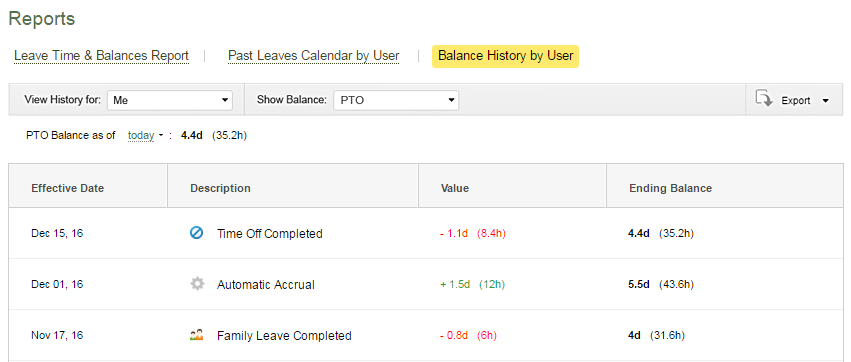
Keep your pulse on employees’ leave balance history in actiPLANS to make sure everyone takes enough time off.
2. PTO donations
This PTO employee benefit offers a fantastic way for employees to support their colleagues in times of need.
It is perfect for those instances when you’ve got a ton of unused vacation days piling up, while a co-worker is dealing with a personal emergency and needs more time off than they have. By donating some of your PTO to them, you can help them out without any extra effort or cost on your part.
Pro:
- When employees see their peers stepping up to help one another, it can create a more cohesive and caring workplace culture.
Cons:
- Managing PTO donations can be complex for HR departments as it requires additional resources and strict adherence to policies.
- Employees with less PTO might feel pressured to donate even when they can’t afford to, while those with ample PTO may not feel the need to contribute.
Best for:
PTO donations are best suited for companies that need to cultivate a strong culture of employee camaraderie and community engagement. These include non-profits, emergency services, and healthcare organizations, where team spirit and mutual support are highly valued.
Learn more about effective PTO management here 👈
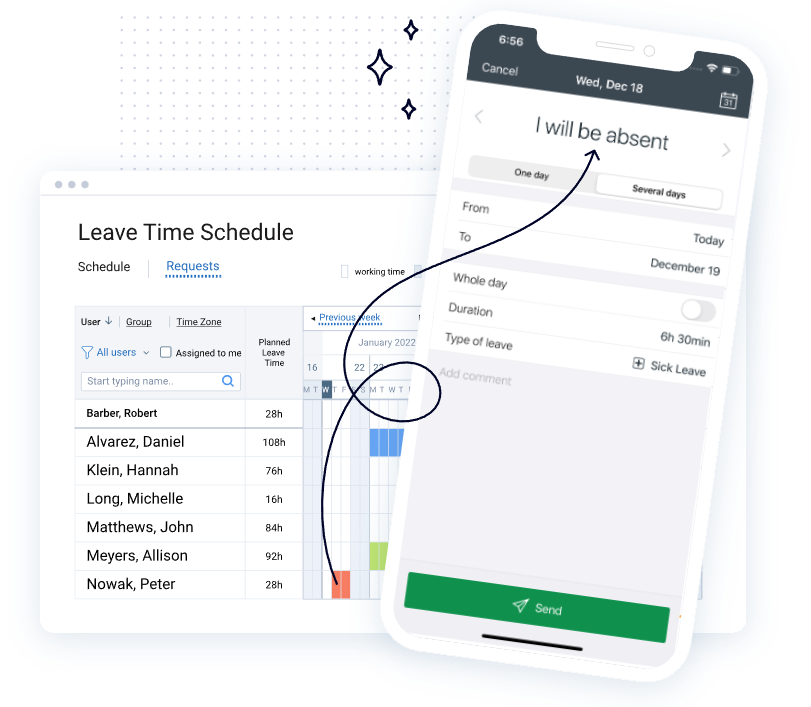
Use actiPLANS Mobile to easily request leave time, share notes with colleagues, and check on their availability.
3. Unlimited PTO
Unlimited PTO is exactly what it sounds like – a flexible vacation policy that grants employees the freedom to take time off work as they see fit, without a specific limit on the number of days off.
This forward-thinking approach trusts employees to manage their own PTO without sacrificing work quality or team objectives. Basically, it’s like having an all-you-can-eat buffet of vacation days, but with the expectation that you won’t abuse it.
Pros:
- The trust and autonomy associated with unlimited PTO can lead to higher team morale and motivation among employees.
- When given the freedom to rest and recharge as needed, most employees return to work more energized and productive.
- Offering unlimited PTO can make a company more attractive to potential hires who value flexibility and autonomy.
- It can also contribute to retaining current employees who appreciate the trust and freedom this policy demonstrates.
Cons:
- Without clear guidelines, there’s a risk that some employees may take advantage of the unlimited PTO policy, which may consequently worsen your overall team performance.
- Unlimited PTO is linked to challenges in schedule management – you need to ensure that all the roles are covered throughout the year (particularly during a peak vacation season or when multiple employees want to go absent simultaneously).
- Ironically, unlimited PTO can lead to employees taking less time off than they would with a fixed PTO policy. This is often due to a lack of clear norms around acceptable amounts of time off, or a culture that implicitly discourages taking advantage of the policy.
Best for:
Unlimited PTO works wonders for companies that champion autonomy and results over clocked hours. Think cutting-edge tech firms, dynamic startups, and any organization that thrives on creativity and innovation.
Find out more about unlimited PTO here 👈
4. Mandatory vacation days
Mandatory vacation days imply that you preset the number of days off employees should get for some quality R&R time each year. In other words, it’s a built-in break system that ensures every team member has a definite chance to unplug, recharge, and come back to work feeling like a million bucks.
Pros:
- Regular breaks reduce stress and prevent burnout, contributing to better overall health among employees. This, in turn, can minimize healthcare costs for employers.
- Mandatory vacation policies help to cultivate a culture that prioritizes employee well-being and balance, contributing to a more positive workplace environment.
Cons:
- Imposing specific vacation dates on employees can decrease morale, especially if the mandated vacation times don’t align with their personal lives or if they feel their autonomy is being undermined.
- If your business operates on thin margins, the financial impact of mandatory vacation days (especially if they coincide with peak work periods) can be significant. This includes not just the cost of paid vacation days but also potential overtime costs or the need to hire temporary staff.
Best for:
Mandatory vacation days are an absolute game-changer for companies in high-stress industries like finance, healthcare, or any place where burnout rates are off the charts.
Learn more about mandatory vacation days here 👈

Schedule leave time in a few simple clicks using the visual timeline in actiPLANS.
5. PTO for volunteering
This PTO benefit is all about giving your employees paid time off specifically to volunteer at a charity or nonprofit.
Besides letting your team members enjoy a little break from work without dipping into their vacation time or savings, it boosts your company’s social responsibility creds and helps the community improve thanks to your skills and enthusiasm.
Pros:
- PTO for volunteering shines a bright light on a company’s values, enhancing its image in the eyes of consumers, potential employees, and partners.
- Volunteering introduces employees to new situations and challenges, helping them develop and improve a plethora of soft skills, including leadership, communication, and problem-solving.
- By stepping out of the office and into the community, employees can connect with individuals and organizations they wouldn’t normally interact with. This opens doors for potential partnerships and business opportunities.
Con:
- Employees in critical roles or on tight project schedules might find it harder to make use of PTO for volunteering. In the end, this can inadvertently promote feelings of inequality or resentment among them.
Best for:
This PTO employee benefit is particularly useful for large companies where corporate social responsibility and a positive corporate image truly matter.
Find out more about PTO for volunteering here 👈
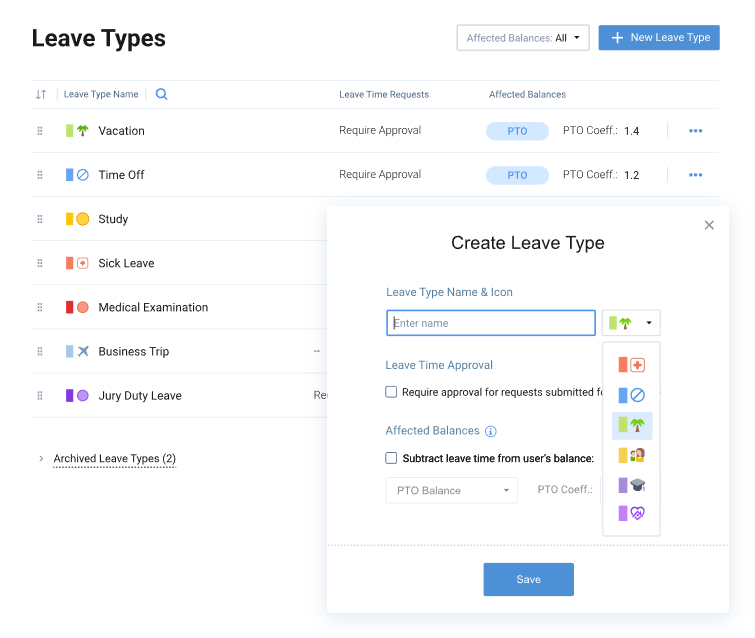
Create as many leave types or PTO benefits in your actiPLANS account as you wish and track them with ease.
6. Wellness days
Sometimes we all need a break for our mental and emotional health, not just when we’re physically under the weather. That’s how wellness days offer a modern twist on the traditional sickness leave.
This PTO benefit encourages taking a proactive approach to health, instead of powering through burnout or stress. It gives employees the space and permission to step back, recharge, and return to work feeling refreshed and more productive.
Pros:
- Regular breaks and attention to mental health can reduce the occurrences of stress-related illnesses, potentially lowering healthcare costs over time.
- Offering wellness days shows that a company values its employees’ well-being, which can boost morale and loyalty. Then, such a positive work environment often translates to reduced turnover rates.
Cons:
- For companies where output directly correlates with presence (e.g., in retail or manufacturing), wellness days off could have direct cost implications due to the need for replacement staff or overtime pay.
- Implementing wellness days off might result in short-term productivity drops, particularly if many employees take their days off around the same time.
Best for:
Wellness days are well-suited for companies operating in high-stress environments like tech startups, financial firms, and healthcare organizations, where the relentless pace of work and the pressure to perform well are an essential part of running the business.
Find out more about wellness days here 👈
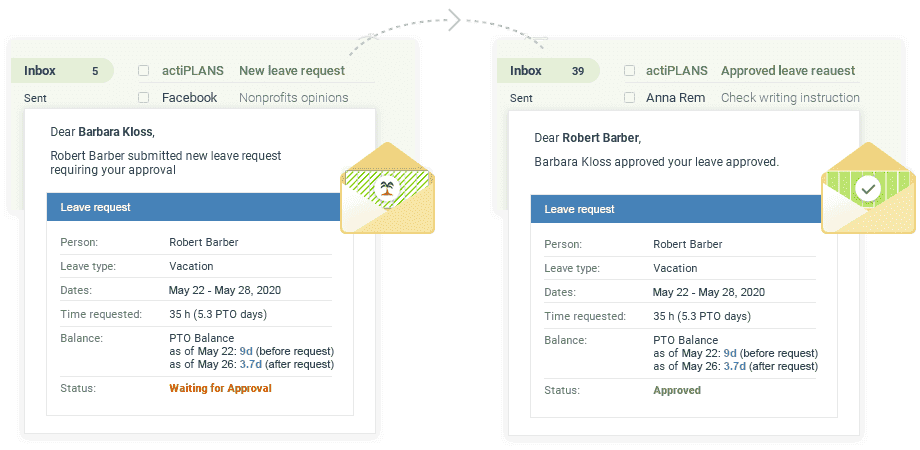
Approve employees’ leave requests without fuss or automate the process entirely with actiPLANS.
7. Floating holidays
Floating holidays are a couple of extra days off each year that employees can use whenever they fancy. Whether it’s for celebrating a non-traditional holiday, extending a weekend for a mini-vacation, or just taking a day to recharge, these days off are all about providing flexibility and promoting work-life balance.
Pros:
- Employees can take floating holidays based on their personal, cultural, or religious needs, which promotes inclusivity and respect for diversity within the workplace.
- By acknowledging and accommodating diverse backgrounds and beliefs, employers can boost morale and job satisfaction, which later translates into higher employee retention rates.
Cons:
- Implementing and managing a floating holiday policy may add to the administrative burden because this PTO employee benefit requires clear guidelines and tracking to avoid misuse or confusion.
- Implementing floating holidays may also lead to staffing and work scheduling challenges. Proper resource planning and coordination are key to mitigate any operational disruptions.
Best for:
Floating days off are particularly well-suited for companies operating in the tech and creative industries with a project-based approach to work and fluctuating workloads. It also does wonders for businesses with a diverse workforce.
Learn more about floating holidays here 👈
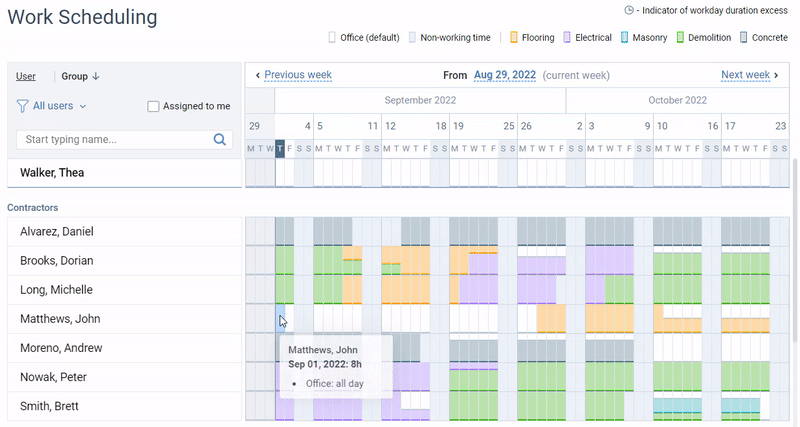
Use actiPLANS to schedule your team’s workloads around the planned employee absences to avoid sudden productivity drops.
8. Parental leave top-up
Want to step in to boost employees’ government-paid parental leave benefits? Then, parental leave top-up is exactly what you need.
By offering it to your team members, you’re basically saying, “Hey, we know that being a new parent is tough, and those government cheques might not cover all your needs, so here’s a little extra from us to help out.”
Such an approach will make you a golden star for working parents.
Pros:
- Offering parental leave top-ups for both parents encourages a more equitable division of childcare responsibilities and supports women’s participation in the workforce.
- Demonstrating care for employees’ personal lives fosters a strong employer-employee relationship, which heightens loyalty.
Cons:
- There’s a risk that employees without children or those who do not qualify for leave might feel neglected or undervalued if the benefit package leans heavily towards parents.
- Filling the gap when employees are on long-term parental leave can pose operational challenges, especially for roles that require specialized skills or knowledge
Best for:
Parental leave top-up plans are particularly advantageous for companies operating in highly competitive industries where the battle for top-tier talent is fierce (e.g., tech, consulting, etc.) – it helps to keep the best of the best employees at the workplace even if they’ve decided to prioritize their family over career for a while.
Find out more about parental leave here 👈
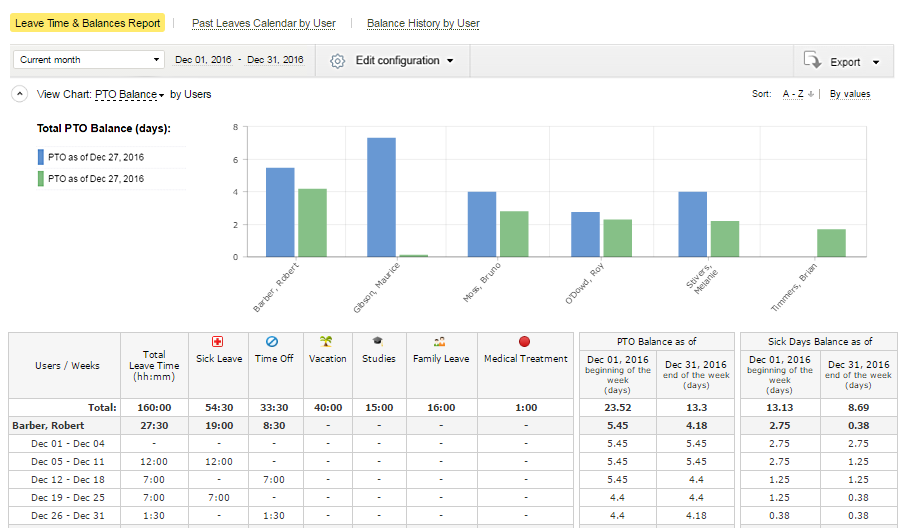
Analyze your staff absence data and workforce dynamics in depth using a variety of actiPLANS reports.
9. Birthday off
This PTO benefit means you get your birthday as an extra paid day off, separate from your usual holiday allowance.
In other words, when your special day comes around, you don’t have to worry about meetings, deadlines, or commuting. Instead, you can spend that time doing exactly what you love.
Pros:
- Allowing employees to celebrate their special day can significantly improve their mood and morale.
- It’s a small perk, but one that can make employees feel valued and appreciated.
Con:
- If an employee’s birthday coincides with an important meeting or a tight project deadline, letting them be absent might result in schedule overruns and similar problems. It’s pivotal to plan workloads, events, and days off in advance to guarantee everything lines up just perfectly.
Best for:
A birthday off is one of the most easy-to-implement PTO benefits out there. Hence, it can benefit a wide range of companies and teams.
Learn how to track employee birthdays here 👈
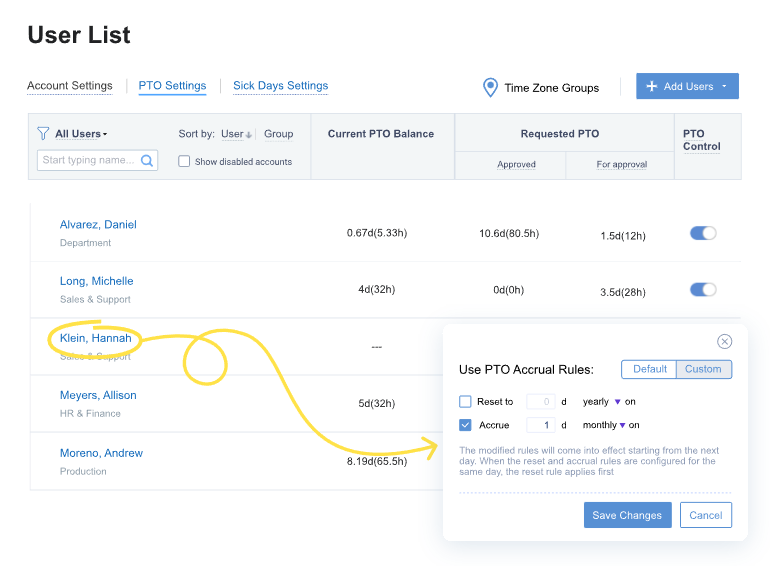
Take advantage of actiPLANS flexibility to set organization-wide and individual PTO management rules for employees.
10. Summer Fridays
With this PTO benefit, employees get to clock out early on Fridays during the summer months. It’s like giving everyone a bit of a head start on their weekends!
The primary idea behind this whole thing is to boost morale and work-life balance among your team members by giving them extra personal time when the weather is nice and the days are long.
Pros:
- Knowing they have a shorter week, employees often work more efficiently during their regular hours.
- A shorter workweek during the summer can help increase overall happiness among employees.
Cons:
- Some might argue that less time in the office each week could potentially lead to a drop in productivity (though this is typically offset by more focused work).
- If the company operates in customer service, reduced hours could worsen response times and service quality.
Best for:
Tech businesses and startups often tout flexible work environments and cutting-edge cultures. So, summer Fridays fit right in with their vibe.
Find out more about flexible work arrangements here 👈
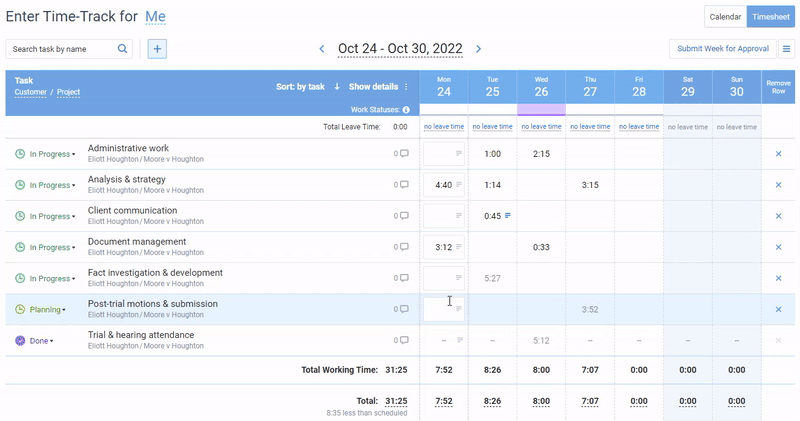
Integrate your actiPLANS with actiTIME to track work hours and stay on top of every task effortlessly.
Conclusion
Offering unusual PTO benefits can truly transform your workplace culture and significantly boost employee satisfaction.
By providing unique and thoughtful time off options, you’re showing your team that you value their well-being and personal growth. This investment in your employees’ happiness will, in turn, lead to a more motivated and productive workforce.
If you’re ready to take your PTO management to the next level, try actiPLANS!
This automation-powered resource scheduling solution will effortlessly streamline your PTO management processes and help you keep your employees always excited about scheduling their next break.
Give your team the PTO benefits they deserve and track them easily with actiPLANS – sign up for a free 30-day trial now. 👇



